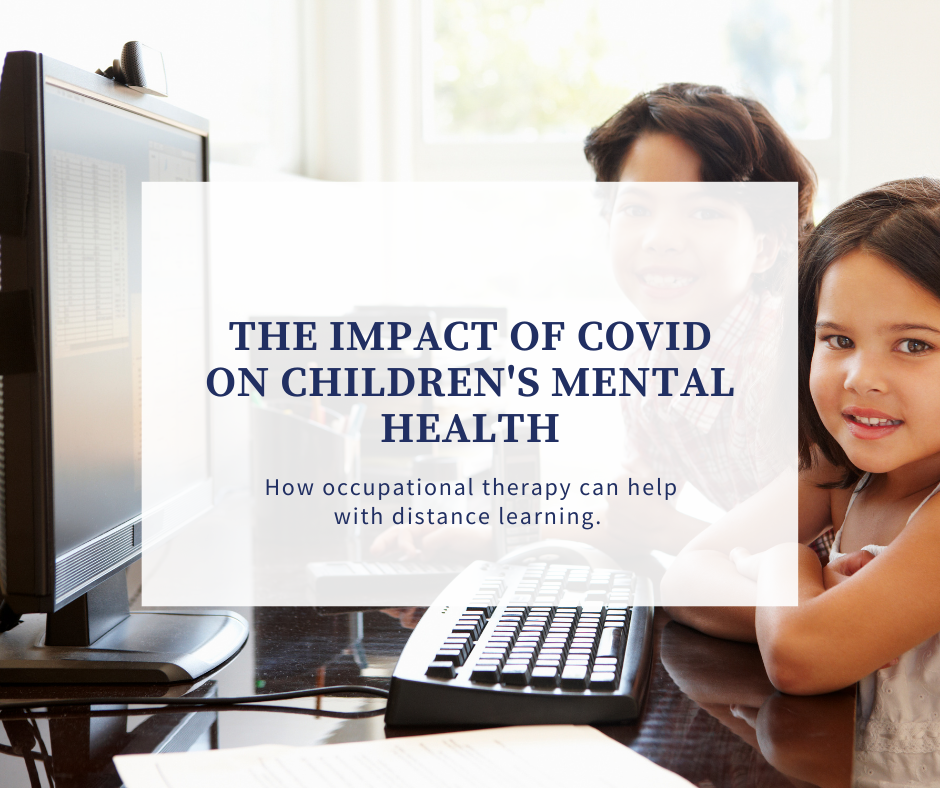To say that COVID-19 has impacted all of our lives would be an understatement. Everyone from adults to children have had their lives and routines disrupted. Staying at home may sound like a dream come true for many children. However, they don’t realize the negative impact this causes during crucial developmental years of their lives.
Childhood and adolescence is where everything from social to organizational skills needed for adulthood is learned. COVID-19 has interrupted the environment for learning, and unless there’s intervention from a professional, the interruption will have a negative effect on their long-term development. Sure, they’re still getting the education they need virtually. Yet, sitting in front of a computer or laptop doing math equations won’t help them develop essential motor and social skills. The skills needed to become functional adults. However, it may seem impossible to find help for our children with the world turned upside down. Fortunately, that’s where occupational therapy can provide needed assistance.
What Is Occupational Therapy?
Occupational Therapy sounds like a complicated term, but it’s a simple, yet effective approach to helping children develop everything from their communication to their sensory processing. Occupational Therapy helps kids who have a physical, cognitive, or sensory disability learn to do self-care tasks, i.e. dressing, bathing, self-feeding, etc, play and interact with peers and equip them with strategies and techniques to successfully learn in school as well as at home.
While Occupational Therapy helps everyone regardless of their age, it’s especially crucial for children to undergo this therapy during very important developmental stages of life. The primary goal of Occupational Therapy is to help children eventually gain independence in their lives. These goals are met by addressing any difficulties or delays with their social, physical, or emotional development.
Occupational Therapists work with children to successfully navigate their everyday lives by doing activities to improve their sense of self-worth and accomplishment. Even basic life skills such as brushing teeth and managing frustration are practiced. One of the main benefits of Occupational Therapy for children is improving their focus and attention.
How Can Occupational Therapy Help With A Child’s Attention And Focus?
More and more children suffer from developmental disabilities such as ADHD and Autism. These disabilities can have a detrimental effect on a child’s attention and focus. They cause symptoms such as:
- Poor time management skills
- Difficulty multitasking
- Inability to manage frustration
- Disorganization
- Poor eye contact
- Poor social skills
Occupational Therapists work to break down the barriers that keep these children from living relatively normal lives by helping them manage symptoms. These children are prone to low self-esteem, the inability to become independent, and mood disorders such as depression or anxiety. Occupational Therapists customize their treatment plans for each individual child. There is not a one-size-fits-all approach when it comes to the needs of different children with Occupational Therapy.
Additionally, in this time of COVID-19, Occupational Therapy can assist in implementing a positive working environment at home for distance learning and other activities to help children to optimize their learning and skill development.
Setting Up A Working Environment At Home For Distance Learning
Unfortunately, many of us are at home doing everything virtually. Parents are working out of the home while children are learning how to utilize technology to access their classes. Regrettably, the home is also where there are many distractions for a child, especially when they’re acclimating to distance learning. Occupational Therapists help parents and children keep their work and study environment organized and optimized through different strategies and techniques.
While keeping distractions to a minimum during work and study time is a start, another approach is helping children keep track of their time by learning time management. Time management is especially important for children to learn when they are young. If they don’t learn effective management of their time, they may have difficulty functioning as an adult, i.e. getting to work on time. Occupational Therapists use varied approaches to help children develop effective time management skills.
One of the most effective ways to help develop time management skills is to improve a child’s self-confidence by providing them with success oriented tasks. One of the reasons children get frustrated easily by tasks is that they perceive them as being difficult.. To a parent, these tasks may seem simple. However, to a child who hasn’t built up their self-confidence, they seem difficult. Occupational Therapists help break down even the simplest of tasks into manageable steps.
Success in small tasks helps to ease anxiety by helping the child develop a sense of accomplishment in these stressful days. Anxiety is a difficult emotional state t to overcome for children as well as adults.
Occupational Therapy On Anxiety management
Children and adults alike suffer from anxiety to some degree, at any point in their lives. While adults are sometimes consciously aware of when they’re suffering from anxiety, children do not understand these feelings of overwhelming worry and fear. Occupational Therapists provide strategies and techniques to children to manage their anxiety and stress.
Occupational Therapy incorporates therapeutic exercise into their programs. We all know exercise is one of the most effective treatment methods for anxiety. Believe it or not, exercise can quickly and effectively calm a child down, and having some form of movement and physical activity is a great addition to any coping skills toolbox.
Anxiety makes it difficult for a child to focus on functioning in everyday situations. This is especially true for children in special education or children with learning disabilities. Anxiety delays cognitive and social development. These delays may also cause long-term anxiety disorders when they reach adulthoods that can affect their careers and relationships.
Occupational Therapists help teach children coping mechanisms and other tangible techniques to overcome anxiety, such as guided imagery,deep pressure, and deep breathing. These are all practices parents and children can use when feeling overwhelmed.
It’s especially important to learn how to manage anxiety in this day and age with the coronavirus keeping both adults and children on edge. Children, especially, are unable to cope with the uncertainty and want to know when their lives will go back to normal. They fear the idea of growing up at home without being able to play with their friends at the park or go to movies. Occupational Therapists are here to help!
For more information on Occupational Therapy services for children during these trying times, please contact us.

